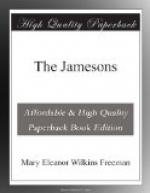“My good woman,” said she, “you look very neat and tidy yourself, and I don’t doubt are a good plain cook; I am willing to try your house if it is not surrounded by trees and there is no standing water near; I do not object to running water.”
In the midst of this speech the elder daughter had said in a frightened way, “Oh, mamma!” but her mother had paid no attention. As for myself, I was angry. The memory of my two years at Wardville Young Ladies’ Seminary in my youth and my frugally independent life as wife and widow was strong upon me. I had read and improved my mind. I was a prominent member of the Ladies’ Literary Society of our village: I wrote papers which were read at the meetings; I felt, in reality, not one whit below Mrs. H. Boardman Jameson, and, moreover, large sleeves were the fashion, and my sleeves were every bit as large as hers, though she had just come from the city. That added to my conviction of my own importance.
“Madam,” said I, “I do not take boarders. I have never taken boarders, and I never shall take boarders.” Then I turned and went out of the room, and downstairs, with, it seemed to me, much dignity.
However, Mrs. Jameson was not impressed by it, for she called after me: “My good woman, will you please tell Mrs. Liscom that I must have some hot water to make my health food with immediately? Tell her to send up a pitcher at once, very hot.”
I did not tell Caroline about the hot water. I left that for them to manage themselves. I did not care to mention hot water with Caroline’s stove as wet as if it had been dipped in the pond, even if I had not been too indignant at the persistent ignoring of my own dignity. I went home and found Louisa Field, my brother’s widow, and her little daughter Alice, who live with me, already there. Louisa keeps the district school, and with her salary, besides the little which my brother left her, gets along very comfortably. I have a small sum in bank, besides my house, and we have plenty to live on, even if we don’t have much to spare.
Louisa was full of excitement over the false alarm of fire, and had heard a reason for it which we never fairly knew to be true, though nearly all the village believed it. It seems that the little Jameson boy, so the story ran, had peeped into the kitchen and had seen it full of smoke from Caroline’s smoky chimney when she was kindling the fire; then had run out into the yard, and seeing the smoke out there too, and being of such an exceedingly timid temperament, had run out to the head of the lane calling fire, and had there met Tommy Gregg, who had spread the alarm and been the means of calling out the fire department.




